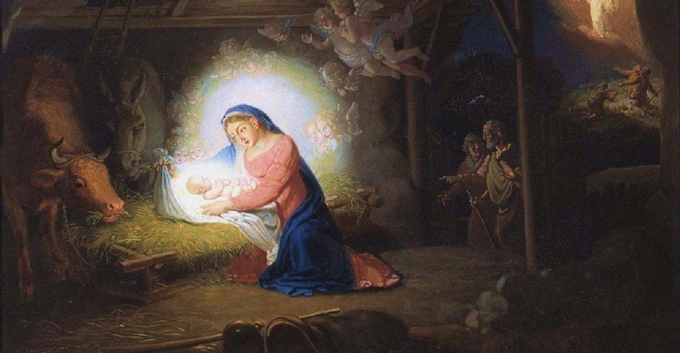Christmas time is here. If I wasn't off my work, it would definitely be the worst week of the year. Unhappy looking back upon yet another year of getting older deepens one's unhealthy cyclic perception of time. Obnoxious ballast Christmas gifts and dozens of senseless customs. Luckily enough, I still have to write like 9997 out of 10000 words in my lame English for my killer papers in New Testament Theology and NT Backgrounds, so neither boredom nor good sleep are expected.
But weeping is not what I wanted to share. What I wanted to share is an imaginary Christmas card from Karl Barth.
Considering length of Barth's shadow, we may say that he is one of the most unexplored and unreviewed theologian. The grandpa who launched neoorthodoxy remains traduced throughout scholarly papers. If you asked our undergraduate students about C.S. Lewis, Bonhoeffer, Luther or Augustine, you might expect at least one or two sensible answers. If you asked them about Barth… no way! We may try to change this by explaining what did Barth think about the celebration of the incarnation of Jesus Christ.
According to Barth, the incarnation bears much greater significance than one would expect. We often tend to think of it as of mere intermediate stage of kenōsis or as of mere opening to an earthly act of the Drama of Salvation. But for Barth it was more than this. It was the climax of God's eternal purpose, because that what actually happened in the incarnation of God is nothing less than unique and ultimate revelation of God in the history of time. Before the incarnation, God remained hidden. No one could have survived seeing him, portrayal of His image was forbidden and His alleged dwelling place was highly unreachable. The only moment of history when God makes himself reachable is the moment of His incarnation in Jesus Christ.
If God speaks, then God speaks, and we have to do with the one Logos that the prophets and apostles received, the one revelation in the incarnation which the people of the Bible know and attest as either promised or manifested.1
Of course, this is not what Barth wrote on Christmas Cards for his friends. In context of this quote, Barth struggles with natural theology of schoolmen (i.e. Aquinas, …) which proposed that God can be unveiled by stark postulates and axioms of pure logic. This approach Barth vigorously repudiates throughout his writings. Barth proposed that it was pure reason and natural knowledge that actually led mankind into darkness of separation from God. And it is revelation of God – just the opposite of natural knowledge – which gets mankind back on track. Everything in Barth's theology seems to revolve around the event of incarnation. Just notice the last sentence of this quote from Dogmatik im Grundriss (and apologize my loose translation from Czech lang.):
Because here we are in the center. And although it may seem distant, obscure and hard, we may be eventually able to confess: Here it is actually very simple, plain and childlike. It's exactly now when I must cry out as a professor of systematic theology: “Watch out! Everything's at stake! Either science, or the greatest delusion!” Right now I stand before you as a Sunday school teacher before little children, who's supposed to tell something that even a child in the age of four could understand: “The world was lost, Christ is born: Rejoice, rejoice, O Christianity!”2
Christ ist geboren: Freue, freue dich, o Christenheit! This is what the old man wanted to tell us about Christmas. I apologize for not quoting dozens of sources. If you need some help with your research paper, just ask in comments down there and I may drop something on you. Also remember that I'm not a barthian. I'm quite suspicious about his soteriology. (Didn't he fail to avoid universalism?)
Have a blessed Christmas and contemplate the importance and value of the only and the ultimate revelation of God which took place in Jesus Christ.
[footnotes]
- Karl Barth, The Gottingen Dogmatics: Instruction in the Christian Religion, p. 92[↩]
- Karl Barth, Dogmatik im Grundriss, 77; My own loose translation from Czech language.[↩]

Great article on Karl Barth! :)